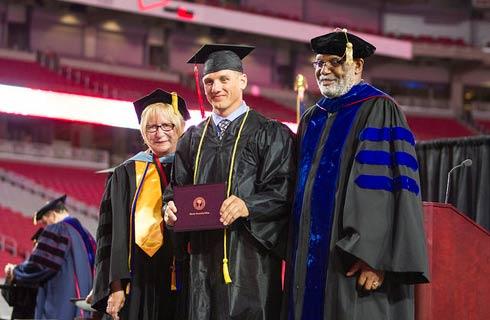工业工程理学硕士
Master of Science in Industrial Engineering

学历文凭
Masters Degree

专业院系
Department of Industrial and Systems Engineering

开学时间

课程时长

课程学费

国际学生入学条件
IDP—雅思考试联合主办方

雅思考试总分
7.0
- 雅思总分:7
- 托福网考总分:100
- 托福笔试总分:600
- 其他语言考试:a minimum DET score of 105 is required for admission.
CRICOS代码:
申请截止日期: 请与IDP联系 以获取详细信息。
课程简介
The MS in industrial engineering program supports two major paths: one focusing on courses and one on research and a thesis. The first path is intended primarily for students who wish to advance their technical knowledge and move toward a career in industry. The second path also is a good choice for students interested in industry, but it is targeted more toward developing independent research skills and writing, and it also can support future graduate work.<br><br>Both paths expect some diversity of technical skills in three major areas which include systems, human factors, and analytics. The systems area emphasizes the design, construction, and analysis of complex systems with interdependent parts that include people and machines. The human factors area emphasizes the interaction of people with systems, and includes the study and analysis of people's cognitive and physical limitations. The analytics area emphasizes the application of mathematical formulas, including statistical approaches, as well as algorithmic and computational approaches to deriving knowledge from data. Each area is supported by several faculty members and many faculty members support multiple areas, see Facilities in the Department of Industrial and Systems Engineering section of the catalog to learn more about each research lab and its activities.
相关申请
 预科
预科 奖学金
奖学金 实习机会
实习机会 在校学习
在校学习 跨境学习
跨境学习 校园授课-线上开始
校园授课-线上开始 在线/远程学习
在线/远程学习
开学时间&学费
学费信息仅供参考,请与IDP联系以获取详细信息
| 开学时间 | 时长 | 学费 | 地点 |
|---|
学校排名

世界排名201
数据源:
泰晤士高等教育世界大学排名
关于爱荷华大学

爱荷华大学坐落于美国中部的爱荷华州东部的一个小城——爱荷华城。爱荷华大学现有超过29000名学生,其中64%来自艾奥瓦州,21%来自周边各州。她也招收大量国际学生,分别来自109个国家和地区,占全校总人数的7%。爱荷华大学在医学、基因、水力学、语言听力,专科方面世界闻名,同时在农业医药、生物分析、生物工程、生物医学,药理学等领域有重要的创新。她在听力学、版画制作、写作、言语病理学、护理服务管理等方向有世界一流的研究生教育项目。以为代表的该校科学家是美国空间科学研究的开创者。他们设计和建造的研究设备被超过50个美国人造卫星和空间探测器使用。该校下属的医院已经连续十多年被评为美国最好的医院之一。该校的工程学院发展了世界领先的高级驾驶模拟器。同时爱荷华大学的医学专科是全世界著名的,已经连续17年被评为全美最佳医院。该校是全美最早开设精算专业的大学之一,在业界有着丰富的校友资源,仅2000年之后取得北美精算师(FSA/FCAS)头衔的该校校友已经超过百人。爱荷华大学位于爱荷华州西南的爱荷华市,紧邻爱荷华河而建,校园占地 1900 英亩,是美国重要的公立研究院校。 爱荷华大学共有 11 个院系,文理学院最大,占每年本科招生的最大比例。 亨利.B.特彼商学院、罗伊.J和露西尔.A.卡弗医学院及教育系、工程系、法律系、护理系、药剂系也都招收本科生。牙医系和公共健康系与研究生院一起,提供研究生教育。
本校相关课程
其他相关课程

机械与机电工程专业哲学博士-纳米技术
 滑铁卢大学
滑铁卢大学学历文凭
Ph.D.
开学日期
课程费用总额


机械和机电一体化工程应用科学硕士-纳米技术
 滑铁卢大学
滑铁卢大学学历文凭
Masters Degree
开学日期
课程费用总额


机械与机电工程应用科学硕士
 滑铁卢大学
滑铁卢大学学历文凭
Masters Degree
开学日期
课程费用总额


工业工程哲学博士
 达尔豪斯大学
达尔豪斯大学学历文凭
Ph.D.
开学日期
课程费用总额


机械工程哲学博士
 达尔豪斯大学
达尔豪斯大学学历文凭
Ph.D.
开学日期
课程费用总额


机械工程应用科学硕士
 达尔豪斯大学
达尔豪斯大学学历文凭
Masters Degree
开学日期
课程费用总额










 美国
美国


